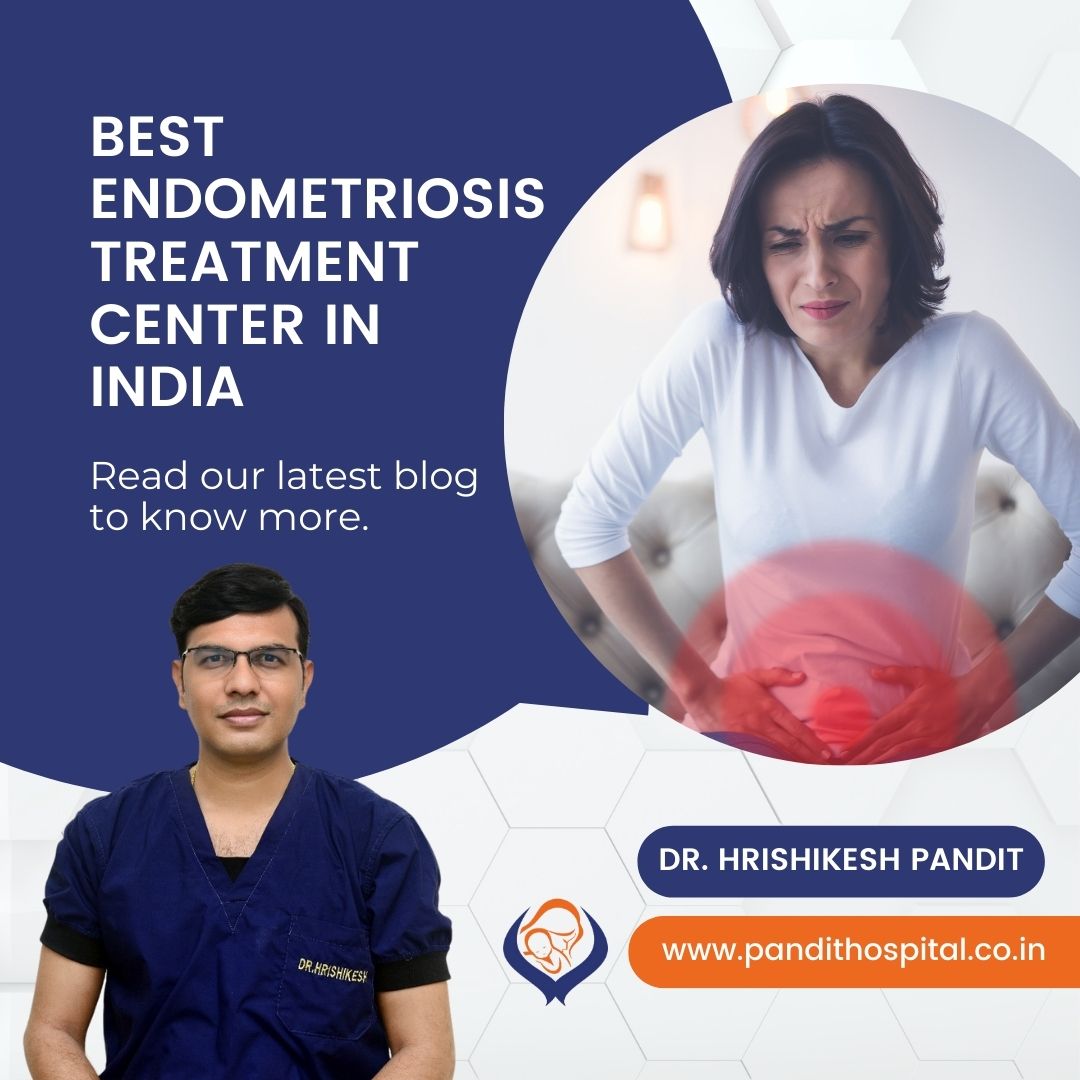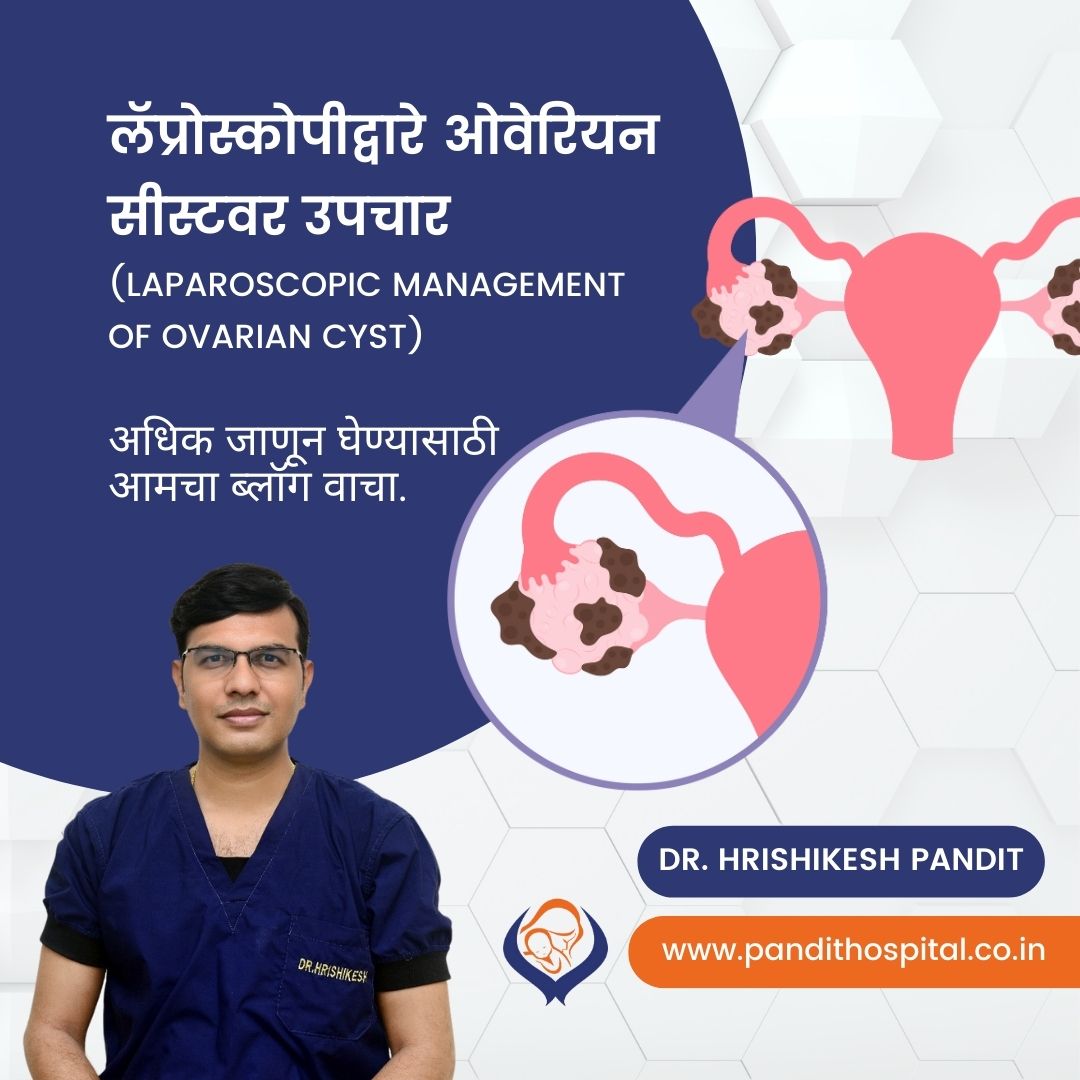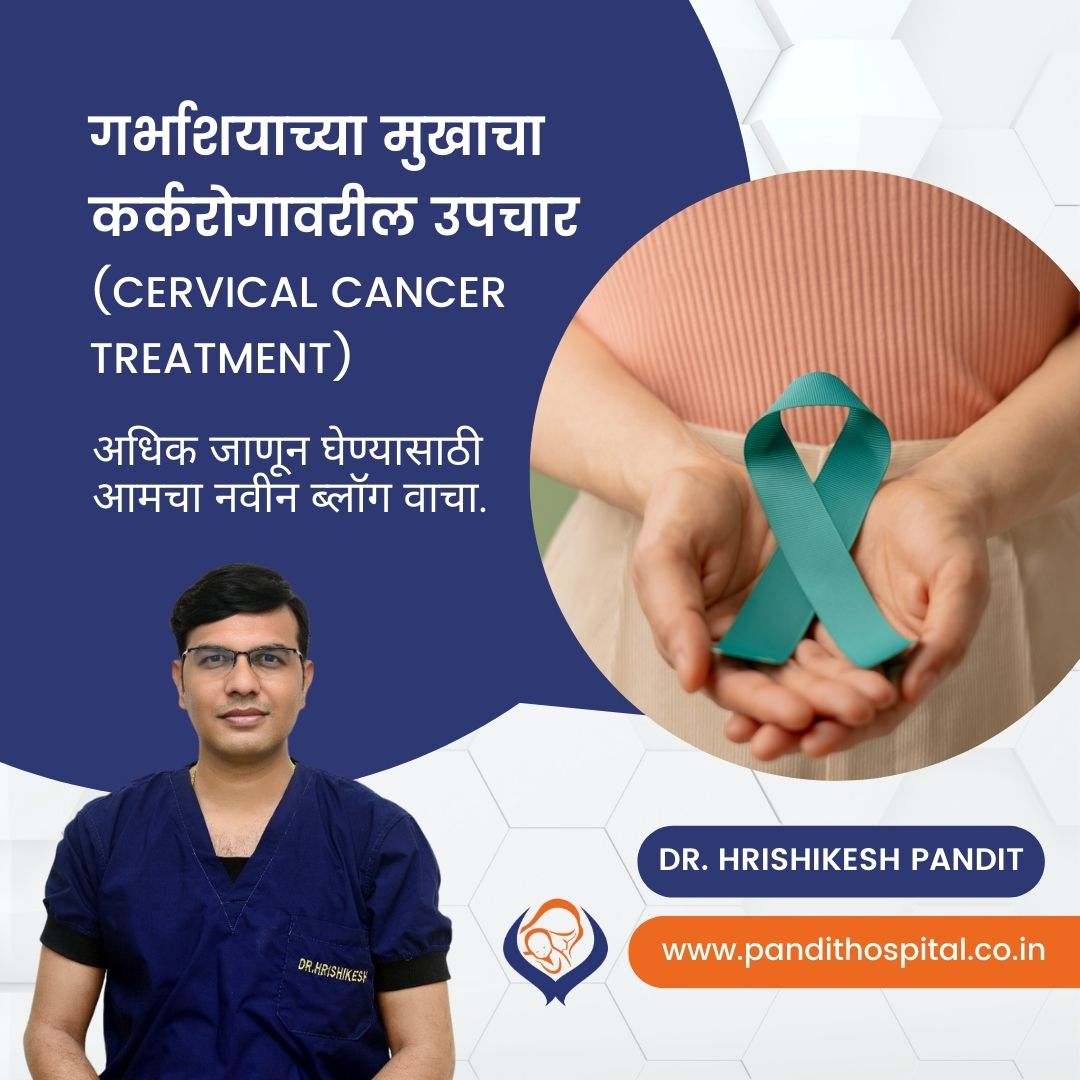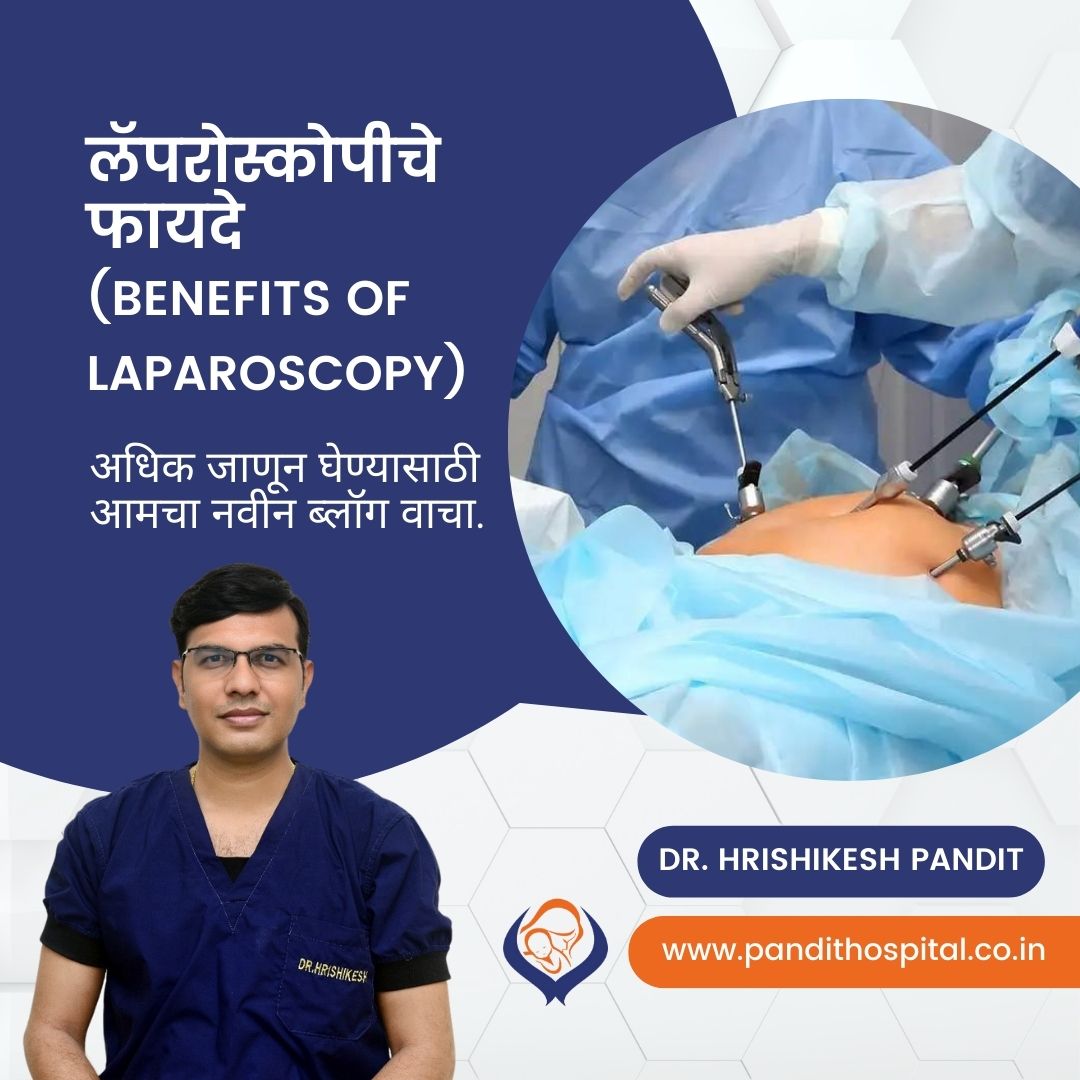Are you among the millions of women worldwide who battle the often-silent struggle of endometriosis? If so, you understand the debilitating pain and frustration that accompany this complex condition. At Pandit Hospital, we empathize with your journey and are dedicated to providing comprehensive care tailored to your needs. Led by Dr. Hrishikesh Pandit, a renowned Laparoscopic Gynecologist and Endometriosis Expert, our center stands at the forefront of endometriosis management in India.
Read this blog in Marathi or Hindi
Endometriosis is a chronic condition where tissue similar to the lining of the uterus grows outside the uterus, commonly affecting the pelvic organs. This misplaced tissue responds to hormonal changes, leading to inflammation, pain, and the formation of adhesions and scar tissue.
The symptoms of endometriosis can vary widely among individuals but often include:
- Chronic pelvic pain
- Painful periods (dysmenorrhea)
- Pain during intercourse (dyspareunia)
- Heavy menstrual bleeding
- Infertility or difficulty conceiving
- Gastrointestinal issues such as diarrhea, constipation, or bloating
If you experience any of these symptoms, especially if they interfere with your daily life or fertility aspirations, it’s crucial to consult a gynecologist specializing in endometriosis. Early detection and intervention can significantly improve outcomes and quality of life.
Endometriosis is classified into four stages (I to IV) based on the extent and severity of the disease. While stage doesn’t always correlate with symptoms, it can guide treatment decisions.
One of the most challenging aspects of endometriosis is its impact on fertility. The condition can cause scarring and adhesions that interfere with the function of the reproductive organs, making conception difficult. However, with proper management and treatment, many women with endometriosis can still achieve pregnancy.
At Pandit Hospital, we offer a multidisciplinary approach to endometriosis care, encompassing medical management, surgical interventions, and holistic support. Dr. Hrishikesh Pandit, with his expertise in laparoscopic surgery, employs minimally invasive techniques to diagnose and treat endometriosis effectively.
Laparoscopic surgery, also known as keyhole surgery, offers several advantages for women with endometriosis:
- Minimal scarring and faster recovery compared to traditional open surgery
- Reduced postoperative pain and discomfort
- Enhanced visualization of pelvic structures for accurate diagnosis and precise treatment
- Lower risk of complications such as infection and blood loss
As a leading center for endometriosis treatment in India, Pandit Hospital is committed to providing compassionate care and personalized treatment plans tailored to your unique needs. Under the guidance of Dr. Hrishikesh Pandit, our team strives to empower women with endometriosis to reclaim control over their health and well-being.
Don’t let endometriosis dictate your life. If you’re struggling with symptoms or fertility challenges, schedule a consultation with Dr. Hrishikesh Pandit at Pandit Hospital, Ahilyanagar, India. Together, we’ll navigate your journey towards healing and hope.
At Pandit Hospital, you are in safe hands!
To consult Dr. Hrishikesh Pandit, Click Below,
Pandit Hospital – Best Maternity care center in Ahmednagar
LET’S SEE OUR INTRO VIDEO
At Pandit Hospital, we provide all the maternity services from antenatal to postnatal period under one roof
Let's Connect!!
0241-2441717 / 0241-2442344
About author:
Dr. Hrishikesh Pandit:
Dr. Hrishikesh Pandit is one of the best obstetrician and gynecologist in India. He is also a well-renowned Laparoscopic surgeon. He obtained his MS (Ob Gyn) degree from the prestigious Pravara Institute of Medical Sciences. He has also done fellowship and diploma courses in laparoscopic surgeries and cancer treatment from Tata Hospital and Keil University, Germany. His surgical cases, papers and videos has been chosen in many international forums of gynecology.
At Pandit Hospital, we are always working hard to provide its patients with the highest level of medical innovation and patient care. With the aim of delivering complete maternity & gynecological care under one roof with the help of all contemporary amenities and cutting-edge medical equipment. Dr. Hrishikesh Pandit has a vision to bring the best of facilities regarding laparoscopy surgeries in the city of Ahmednagar. He is the pioneer of 3D Laparoscopy technology is Ahmednagar.
Latest Articles
Dr. Hrishikesh Pandit is one of the best laparoscopy surgeons in India. His determination to bring 3D Laparoscopy technology to Ahmednagar has eventually helped so many patients. Read the latest articles by Dr. Hrishikesh Pandit on Gynecology, gastric issues, and health tips for mothers during pregnancy.
Discover comprehensive ovarian cyst treatments at Pandit Hospital in Ahmednagar, Maharashtra, led by 3D Laparoscopic Surgeon Dr. Hrishikesh Pandit. Learn about types, symptoms, and both surgical and non-surgical treatments. Best ovarian cyst removal hospital in India.
गर्भाशयाच्या मुखाचा कर्करोग हा महिलांमध्ये होणारा दुसरा सर्वात गंभीर कॅन्सर आहे. वयाच्या 35 व्या वर्षानंतर या आजाराचा धोका फार वाढतो. गर्भाशयाच्या कर्करोगावर लॅपरोस्कोपी (दुर्बिणीने) शस्त्रक्रियेद्वारे उपचार केले जाऊ शकतात.
लॅपरोस्कोपिक शस्त्रक्रियेचे अनेक फायदे आहेत ✔ कमी वेदना ✔ कमी रक्तस्त्राव ✔ रुग्णालयात किमान मुक्काम ✔ जलद रिकव्हरी ✔ कमी कॉम्प्लिकेशन्स ✔ कमी टाके ✔अंतर्गत अवयवांना कमी इजा. Benefits of laparoscopy &Marathi)
FAQ
You should consult a doctor during the first 6 to 8 weeks of your pregnancy, or when your period is 2 to 4 weeks late.
If your contractions are 5 minutes apart, lasting for 1 minute, for 1 hour or longer, it’s time to head to the hospital.
Doctors recommend an infertility evaluation if you have not gotten pregnant after 1 year of having regular sexual intercourse without using birth control. If you are older than 35, an evaluation is recommended after 6 months of trying.
Yes, You can. But most babies need 39 weeks to develop fully. Induced or planned delivery before that time—without a valid medical reason—is not in the best interest of the baby or the mother. After 39 weeks you can plan delivery.
Women who are 21 to 29 should have a Pap test alone every 3 years. HPV testing alone can be considered for women who are 25 to 29, but Pap tests are preferred. Women who are 30 to 65 have three options for testing. They can have a Pap test and an HPV test (co-testing) every 5 years. They can have a Pap test alone every 3 years. Or they can have HPV testing alone every 5 years.
Laparoscopic hysterectomy is a safe and suitable procedure for chosen patients. It affords patients advantages like less peri-operative morbidity, better life quality, shorter hospitalization time, and faster return to activity.
Schedule a doctor’s visit if you have: Greenish, yellowish, thick or cheesy vaginal discharge; Strong vaginal odor; Redness, itching, burning or irritation of your vagina or the area of skin that surrounds the vagina and urethra (vulva); Bleeding or spotting unrelated to your period.
Painless delivery can be achieved using a form of regional anesthesia that provides pain relief during natural labor. Epidural anesthesia is administered through an injection on the lower back of the mother. The drug takes about 10-15 minutes to take effect.
Even in severe cases of endometriosis, most can be treated with laparoscopic surgery. In laparoscopic surgery, your surgeon inserts a slender viewing instrument (laparoscope) through a small incision near your navel and inserts instruments to remove endometrial tissue through another small incision.
The HPV vaccine is recommended for routine vaccination at the age of 11 or 12 years. (Vaccination can be started at age 9.) It is also recommended that vaccination for everyone through age 26 years if not adequately vaccinated when younger. HPV vaccination is given as a series of either two or three doses, depending on age at initial vaccination.





